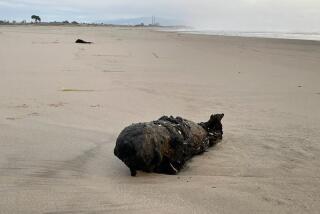Bombs Rained on Florida Family in 1944 : World War II: Four family members died when Army Air Corps plane accidentally unleashed its munitions during training mission. Survivors recall their living hell.
- Share via
DEFUNIAK SPRINGS, Fla. — The flares went up just about every night during World War II, a prelude to the bomb tests at the Air Force base a mile and a half away.
On Aug. 11, 1944, four stars shooting overhead mimicked the flares. The Cossons, gathered in the yard after dinner, heard the familiar drone of a plane and then the unbelievable: the whine of bombs.
That was the night American bombs wiped out four members of one family in this Florida Panhandle city.
“The flares seemed like they were closer this night,” said David Cosson, who was 12. “My dad looked up and said: ‘There’s four shooting stars; that’s a bad sign.’ ”
Then came the bombs.
“You could hear them whistling,” cousin Frank Cosson said.
The 20-pound fragmentation bombs, meant to scatter deadly debris on impact, killed Alfred Cosson, brother James and two of James’ children, 14-year-old James Jr. and 12-year-old Winnie.
Alfred’s son, David, and James’ sons, Frank and Thomas Cosson, were injured. So were James’ wife, Annie Belle, and Alfred’s wife, Pearl, who have since died.
The blasted house is gone now, the farm turned to forest. A sign posted by relatives notes the night’s toll.
Three Cossons who were at ground zero survive today. David, who has endured about 100 operations, is paralyzed from the waist down. He lost one leg to infection. Thomas joined the Army at 17 to support his mother, then built up a construction business. Frank, rejected by the Army, Air Force and Navy because of his bomb injuries, was later drafted into the Army and built his career there. He retired after he was wounded in Vietnam, coming home blind in one eye and deaf in one ear.
Frank has made his peace with that 50-year-old loss: “If you go through life holding a grudge or hatred against somebody, it just eats you up inside.”
All the same, that night’s sights, sounds and smells are still vivid.
Alfred and Winnie had started running up the dirt road when the first bomb exploded between them. At least two more were to come.
Others raced for the house. James Jr. had gotten to the front door when shrapnel hit him between the eyes. “It hit him so hard it knocked his brains up on the window,” David said.
“Uncle Jim, he made it to the front steps and a piece caught him in the back of the head and spun him around three times. And every time he went around blood spewed on the porch.”
David was on his uncle’s heels when shrapnel hit him in the back of the head. He got up and a piece caught him in the back. “I guess it knocked me about three somersaults,” he said.
Nine-year-old Frank was on the porch. He was hit in the abdomen. “I can still smell the smoke of the bombs,” he said.
His brother, Thomas, who was 4, remembers something else.
“Even now I can get the smell of that blood in my nostrils,” said Thomas, who has a 10-inch shrapnel scar on his side. He’d been lying in bed when the bombs fell.
Winnie lay on David’s chest, still breathing.
“I looked over and--Lord have mercy--she didn’t even have a face,” David said, his voice cracking.
The next day, Army Air Corps officials explained that one plane’s release mechanism had hung up. Instead of falling three miles inside the Eglin Air Force Base reservation, the bombs remained attached until the device unjammed over the Cosson homestead, a mile and a half away.
The military never identified the plane or the pilot. David’s nephew, Robert Mickler, said a nurse told him years later that the pilot went insane when he learned what had happened.
David, who had to give up his work repairing TVs because his nerves were too bad to allow him to hold a soldering iron steady, received $15,000 more in 1949.
More to Read
Sign up for Essential California
The most important California stories and recommendations in your inbox every morning.
You may occasionally receive promotional content from the Los Angeles Times.










